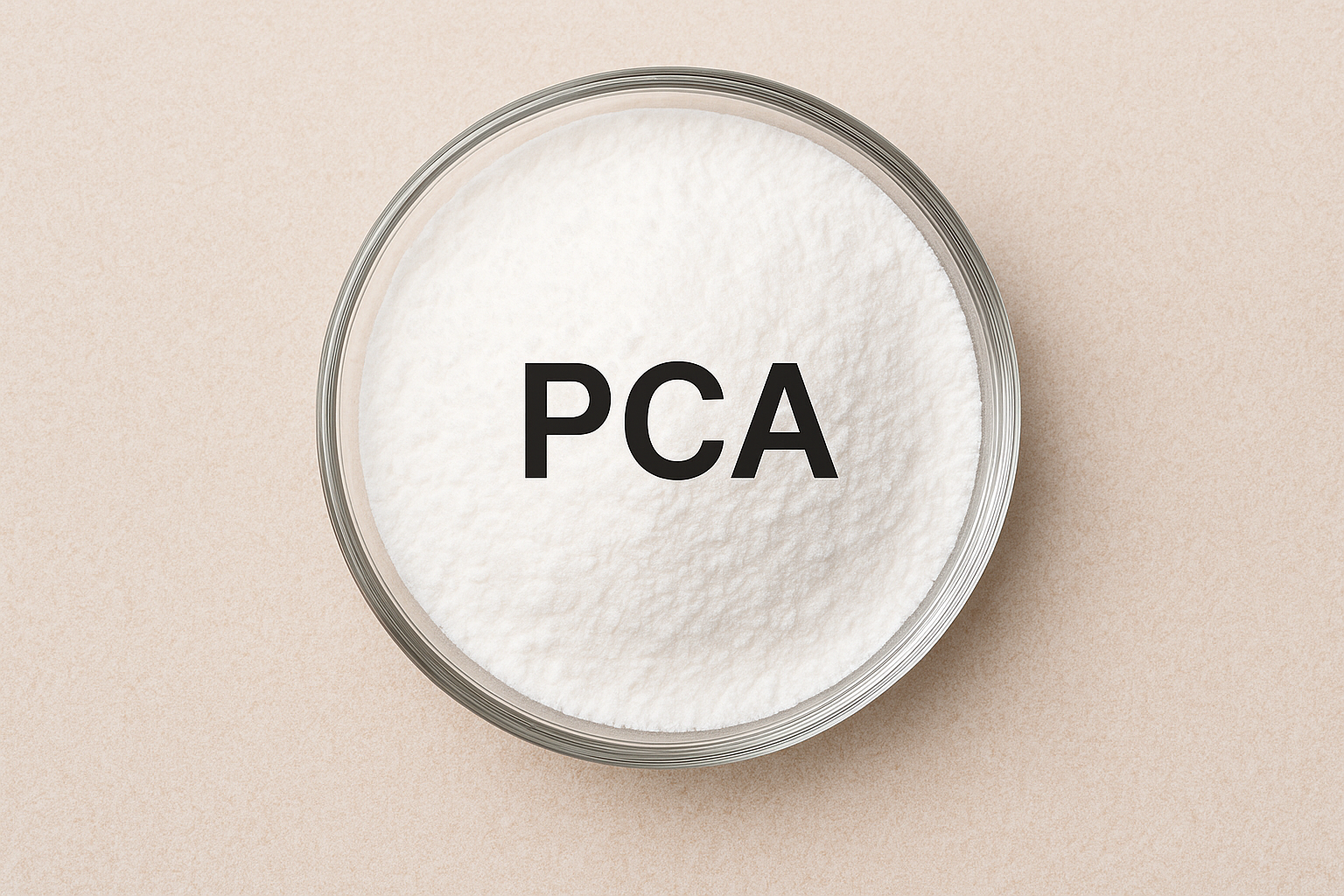
Why do we use PCA (Pyrrolidone Carboxylic Acid)?
o understand how skin stays naturally hydrated, you have to look at its own built-in moisturizing system. A key part of that system is an ingredient called PCA, or Pyrrolidone Carboxylic Acid. It’s a fundamental molecule that helps your skin attract and hold onto water, keeping it balanced and healthy. As a fundamental molecule in our ingredient glossary, it helps your skin attract and hold onto water, keeping it balanced and healthy.
What is Pyrrolidone Carboxylic Acid (PCA)?
Pyrrolidone Carboxylic Acid (PCA) is a naturally occurring amino acid derivative and a major component of your skin’s Natural Moisturizing Factor (NMF). The NMF is a complex group of substances (including amino acids, salts like Sodium PCA, sugars, and urea) that work together in the outermost layer of your skin to keep it hydrated.
PCA is derived from glutamic acid, an amino acid, and acts as a humectant—an ingredient that draws moisture from the air and binds it to the skin cells. Think of it as one of the primary molecules responsible for your skin’s “water-holding” capacity.
PCA vs. Sodium PCA: What’s the Difference?
You will often see both PCA and Sodium PCA in ingredient lists.
- PCA is the acid form.
- Sodium PCA is the sodium salt of PCA.
Both are excellent humectants, but the salt form (Sodium PCA) is generally considered to be slightly more effective at binding water. However, the acid form (PCA) also plays a role in helping to maintain the skin’s healthy, slightly acidic pH. They are often used together in a synergistic “dream team” for hydration.
The Good: The Benefits of PCA in Cream
PCA is a foundational ingredient that works in perfect harmony with your skin.
1. It’s a Cornerstone of Natural Hydration
This is PCA’s most important attribute. Because it is a key part of your skin’s own NMF, your skin instantly recognizes and utilizes it. This “skin-identical” nature means it helps to supplement and support your skin’s own hydration processes in the most natural way possible.
2. It’s a Powerful Humectant
PCA excels at attracting and holding onto water. By binding moisture to the stratum corneum (the outermost layer of skin), it helps to:
- Keep the skin feeling plump, supple, and hydrated.
- Reduce the appearance of fine lines that are caused by dehydration.
- Prevent the feeling of tightness associated with dry skin.
3. It Helps Maintain a Healthy Skin pH
As an acid, PCA contributes to the skin’s acid mantle. This is a very thin, slightly acidic film on the surface of the skin that acts as a crucial barrier against bacteria, viruses, and other potential contaminants. Maintaining a healthy acidic pH (typically between 4.5 and 5.5) is vital for a strong, healthy skin barrier.
The Bad: Are There Any Considerations?
PCA is one of the safest, gentlest, and most non-controversial ingredients in all of skincare. It has virtually no “bad” side effects. The considerations are not about risk, but about understanding its role in a formula.
- It Rarely Works Alone: PCA is a foundational hydrator, but it is a team player. As a humectant, its job is to draw in water. For optimal results, it must be formulated alongside emollients (like oils and butters) and occlusives. The emollients soften the skin, while the occlusives create a seal to lock in the moisture that PCA has attracted.
- Not a Targeted “Treatment”: PCA is essential for skin health and hydration, but it is not a “treatment” ingredient for concerns like wrinkles or hyperpigmentation. Its job is to provide the fundamental moisture that allows all other skin processes to function correctly.
The Verdict
Pyrrolidone Carboxylic Acid (PCA) is a fundamental building block of hydrated, healthy skin. Its natural presence in our own skin makes it an incredibly safe, effective, and compatible choice for boosting moisture levels. When you see it in our products, you can be confident it’s there to support your skin’s most essential function: staying perfectly hydrated.
Source for all claims in this article:
- National Institutes of Health (PubMed Central): Skin Hydration and the Pleiotropic Effects of Pyrrolidone Carboxylic Acid (PCA) and Its Salts – This comprehensive scientific review in the journal Cosmetics provides a deep dive into the critical role of PCA and its salts within the skin’s Natural Moisturizing Factor, detailing their function as humectants and their importance for barrier health.
Frequently Asked Questions about PCA
PCA is the acid form, while Sodium PCA is its salt. Both are excellent at attracting moisture (humectants), but Sodium PCA is slightly more powerful at binding water. PCA also helps maintain the skin’s healthy, slightly acidic pH.
Yes, PCA is excellent for oily skin. As a lightweight humectant, it provides essential water-based hydration without adding any oil or grease. This helps to keep oily skin balanced and can prevent it from over-producing oil due to dehydration.
The PCA used in cosmetics is typically derived from plant sources like soybeans, molasses, or coconut oil through a fermentation process. It is considered a gentle, nature-derived ingredient.
Find PCA in Our Products
(will be updated shortly)
